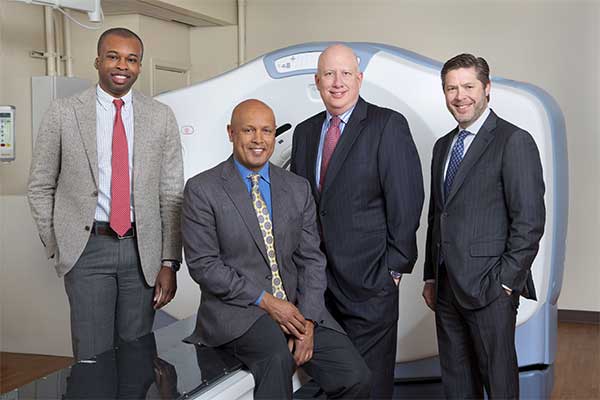Leading Edge Treatment for Sarcomas and Musculoskeletal Tumors
Virginia Cancer Specialists (VCS) offers comprehensive care for Sarcoma and Soft Tissue Tumor Surgery and other musculoskeletal tumors in Northern Virginia. For over 40 years, VCS has been the region’s leader in treating cancers and blood disorders. Now our acclaimed team of experts includes specialists in sarcoma surgery, chemotherapy and radiation therapy.
For the first time in Northern Virginia, patients with these rare tumors will have access to cutting edge clinical trials, expert surgery and advanced radiation therapy techniques – all under one roof.
We treat a high volume of sarcoma patients. More than 2 out 3 patients with sarcomas in Northern Virginia are treated at our center. Patients come to us from Maryland, Virginia and Washington DC, as well as across the Mid-Atlantic region from West Virginia to Delaware.
The Sarcoma Center – Virginia Cancer Specialists Sarcoma Team
Treatment for sarcomas is a team effort between surgeons, medical oncologists and radiation oncologists. Children with sarcomas are treated in conjunction with pediatric oncologists. Our sarcoma team holds twice monthly sarcoma conferences (“tumor boards”) to discuss patients. These are invaluable in reviewing diagnostic information and coordinating treatment among the different specialists.
Musculoskeletal Tumor Surgery and Orthopedic Oncology

Dr. Felasfa Wodajo is a fellowship-trained Orthopedic Oncologist with deep expertise in musculoskeletal tumor diagnosis, resections of bone and soft tissue tumors of extremities and pelvis and endoprosthetic reconstruction of bones and joints.
Adult Medical Oncology
Dr. Alex Spira is also director of the VCS Research Institute and the Phase I Trial Program, in addition to his deep expertise in sarcoma. He has led drug trials for new sarcoma drugs at VCS and was co-author of the February 2016 publication reporting results of Eribulin for sarcoma in the prestigious Journal of Clinical Oncology.
Radiation Oncology
Dr. Gregory Sibley and Dr. Harold Agbahiwe head up the VCS Radiation Oncology department. Before joining VCS, Dr. Sibley was attending Radiation Oncologist and chair of the Cancer Committee at Sibley Memorial Hospital in Washington, D.C. for 14 years. Dr. Agbahiwe previously served on faculty at the Johns Hopkins Department of Radiation Oncology and at Sibley Memorial Hospital in Washington, DC.

IMAGE – From (Left to Right): Dr. Harold Agbahiwe, Dr. Felasfa Wodajo, Dr. Alex Spira and Dr. Gregory Sibley.
Sarcoma Clinical Coordinator
Our dedicated clinical coordinator, Cathie Passero RN, MSN, CCRN, guides patients through the steps of biopsy, radiation, surgery and chemotherapy, while providing the necessary psycho-social support and education.
Treating the Musculoskeletal System
Tumors that develop in bones and soft tissues (musculoskeletal tumors) can be benign, malignant or metastatic. Each of these conditions requires special knowledge and treatment techniques. Virginia Cancer Specialists has the expertise to diagnose and treat each of these tumor types, in adults and in children.
Benign tumors
Benign bone tumors do not spread to other parts of the body but can cause pain and sometimes even fractures. Many of these are more commonly found in children. In contrast, adults are more commonly diagnosed with benign (or malignant) soft tissue tumors. In many cases, these tumors can be diagnosed based on clinical imaging and do not need a biopsy. Often these tumors are unrelated to their symptoms and do not need treatment.
See here for Commonly Treated Conditions (bone and soft tissue tumors)
Sarcomas (bone and muscle cancers)
Sarcomas always require surgery, often in combination with other therapies such as radiation or chemotherapy. As they are malignant, they can spread to other parts of the body.
Sarcomas are uncommon, accounting for less than 1% of all cancers. The infrequency of sarcomas means most doctors seldom see them, so they are often missed or misdiagnosed. The signs of musculoskeletal malignancy vary from person to person. Soft tissue sarcomas are not often painful, while bone sarcomas typically cause dull but persistent pain. Both can grow quickly and behave aggressively, so early detection and treatment is crucial.
Many sarcomas can be cured with proper treatment. Positive results require an accurate diagnosis, a tailored treatment plan, and a highly-skilled multidisciplinary team of specialists, like the musculoskeletal tumor team at Virginia Cancer Specialists.
See here for Commonly Treated Conditions (bone and soft tissue sarcomas)
Metastatic tumors
Many patients with advanced lung, breast, renal or prostate cancer will experience painful metastases to their skeleton at some point. Having access to a team with experience in complex reconstructive surgery around the hip, pelvis and shoulder, as well as advanced radiation therapy techniques, can make the difference between good and poor outcomes for these patients.
A Multidisciplinary Approach
Since musculoskeletal tumors are rare and can be aggressive, it is important to work with a team that has experience and a broad range of disciplines to care for these conditions. At Virginia Cancer Specialists, we offer a multidisciplinary team of specialists headed by Dr. Felasfa Wodajo, an expert in adult and pediatric musculoskeletal tumor surgery. Dr Wodajo is a fellowship-trained orthopedic oncologist, and has been the leading musculoskeletal tumor surgeon in the region for the last decade.
Locations
Patients are seen at our Fairfax office, with surgeries being performed at Inova Fairfax Hospital. Dr. Wodajo also sees patients in Rockville, MD.



